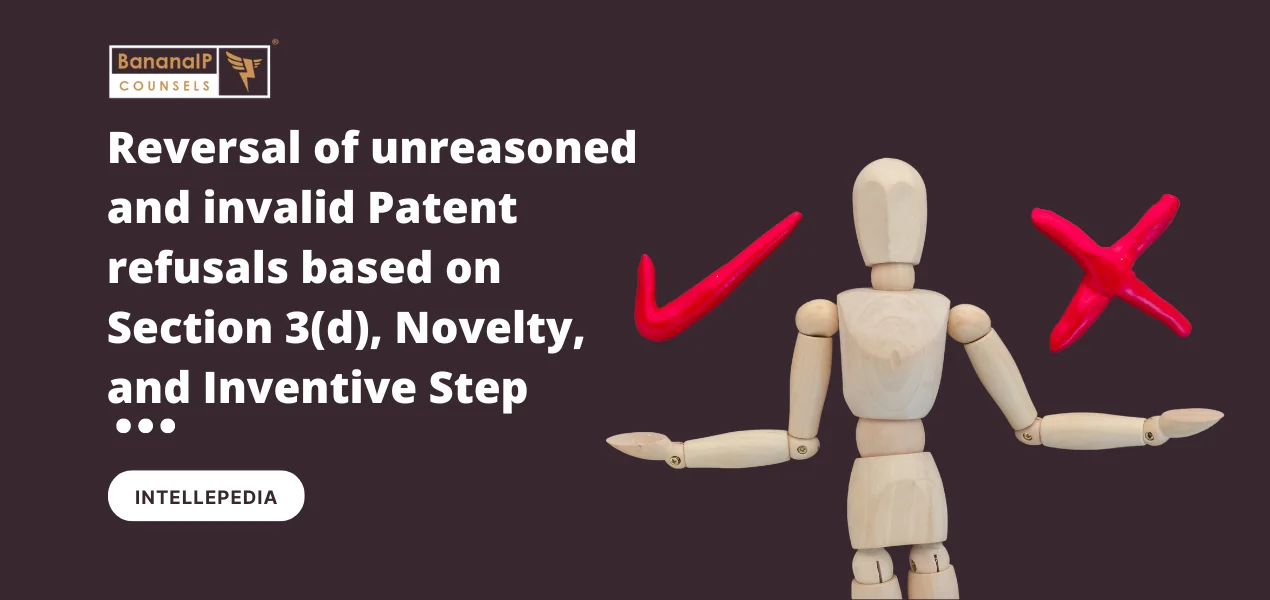In this post, we bring to you 3 patent cases decided by the Delhi High Court and Madras High Court. All three cases are appeals from decisions of Controller of Patents to refuse patent applications. In all the cases, the refusals were set aside as the refusal orders did not include or consider the submissions made by patent applicants.
While one case involved refusal based on novelty when novelty was never raised in the examination report, another case related to a refusal based on Section 3(d) and inventive step without considering the experimental data in the specification and submissions made in the responses filed. In the third case, the Court disagreed with the analysis of the patent officer and decided to permit the patent application to proceed to grant based on teaching away.
Case Notes – Patent Refusals
Patent Refusal based on novelty is not valid when no objection relating to novelty is raised in the examination report, says the Delhi High Court
In an appeal concerning a patent application relating to ‘Character Display Ambiguities’, the Delhi High Court stated that the refusal of the application by the Controller of Patents based on novelty was not valid because no objection was raised relating to novelty in the examination report. The examination report cited 4 prior art documents but did not raise novelty as an objection. The Court stated that important submissions relating to character display based on country code were not considered by the Controller and set aside the order as it was unreasoned.
Citation: Nripendra Kashyap, Constituted Attorney Of Blackberry Limited vs The Assistant Controller of Patents, Madras High Court, 20th November, 2023, (T)CMA(PT)/42/2023 (OA/21/2020/PT/CHN)
Refusal of a patent application without considering examination response, written submissions, and experimental data in the specification is not valid, says the Madras High Court
In an appeal relating to a patent application entitled regulatory compounds for pigmentation, the Madras High Court set aside the refusal order as the Controller did not consider responses and written submissions filed by the applicant. The Controller of Patents refused the patent on 2 grounds: Section 3(d) and Inventive Step. After reviewing the relevant paras of the order, the Court stated that the Controller did not consider the experimental data in the specification relating to enhanced therapeutic effect, and that the order was a mere reproduction of the objections in the examination report and hearing notice. The Court remanded the patent application to the patent office for a fresh consideration by a different officer.
Citation: LIPOTEC, S.A. vs Deputy Controller of Patents and Designs, Madras High Court, 28th November, 2023, (T)CMA(PT)/114/2023, (OA/1/2019/PT/CHN)
Patent application relating to Polyvinyl alcohol film for plant cultivation allowed to proceed to grant by the Madras High Court
On appeal from the rejection of a patent application relating to polyvinyl alcohol film for plant cultivation, the Madras High Court set aside the refusal order of the Controller of Patents based on inventive step and allowed the patent application to proceed to grant. The Controller refused the patent application based on one prior art that relates to a laminate for preventing excessive moisture in green houses. The Court stated that the cited prior art teaches away from the claimed invention, and that there is no suggestion, motivation or teaching in the prior art for a person skilled in the art to arrive at the invention.
Citation: Kuraray Co. Ltd. and Anr. vs The Assistant Controller of Patents & Designs, Madras High Court, 29th November, 2023, (T) CMA (PT) No.47 of 2023 [OA/28/2020/PT/CHN]
Observations
Though the patent office has been aggressively granting patents in 2023, the number of refusals has also significantly increased. It is noteworthy that many appeals from patent refusals over the years are being reversed by Courts based on lack of reasoning, non-consideration of submissions, or invalid determination. In several instances, refusal decisions have also been set aside because new grounds that were not raised in the examination report have been raised at the hearing stage, or form part of the final orders. This practice continues to subsist even today, and hopefully, the IP Office will take note of the cases, and do the needful to establish a process that is in line with established Jurisprudence and patent provisions.
Disclaimer
The case notes in this blog post have been written by IP attorneys at BananaIP Counsels based on their review and understanding of the Judgments. It may be noted that other IP attorneys and experts in the field may have different opinions about the cases, or arrive at different conclusions therefrom. It is advisable to read the Judgments before making any decisions based on the case notes.
If you have any questions, speak with a Patent expert/attorney – [email protected] or 91-80-26860414/24/34.



